What To Feed A Nursing Mother Dog
Feeding a nursing dog the right food, in the right amount, is vital to the health of the adult dog and her pups. While lactating, dogs have a high energy demand and require a much larger amount of calories and fat than they would normally. If your dog is pregnant or has just given birth, talk to a vet about her nutritional needs.
Calculating Food Intake
Calculating Food Intake
A nursing dog will require at least twice as much food as before pregnancy and may require up to 5 times as much if she had a large litter. As a general rule, the American Kennel Club recommends increasing food intake by 25 percent per puppy. For example, if your dog usually eats 2 cups of dry food per day, and she has had six puppies, she will need an additional half-cup per puppy — she should be eating 5 cups per day. This should provide enough calories for her to maintain her body weight. If possible, leave food out and available at all times so she can eat throughout the day.
Adjusting Calories and Fat Content
Adjusting Calories and Fat Content
Increasing calorie and fat content in your dog's diet will ensure that she remains healthy and strong. This is especially important as the weeks progress, since puppies get older and require more milk. A rule of thumb is to increase the amount of food you feed as the puppies grow so that by the third week of nursing, your dog is eating about 300 percent of her pre-pregnancy diet, says an article by Dr. Bretaigne Jones on an AKC website.
Nutritional Content
Nutritional Content
A nursing dog should eat a diet rich in nutrients. High-quality, high-fat foods are better, so ask your vet for a proper commercial diet recommendation. You could also add some fat to the diet. A tablespoon of oil — try fish oil for higher nutrition — can increase calorie content by up to 30 percent.
Things to Keep in Mind
Things to Keep in Mind
Experts discourage adding supplements or feeding homemade dog food as they may not provide a balanced diet. If you suspect your lactating dog is not getting adequate nutrition, it makes more sense to switch to a more nutritious alternative rather than to simply add pills to the mix.
Always check with your veterinarian before changing your pet's diet, medication, or physical activity routines. This information is not a substitute for a vet's opinion.
